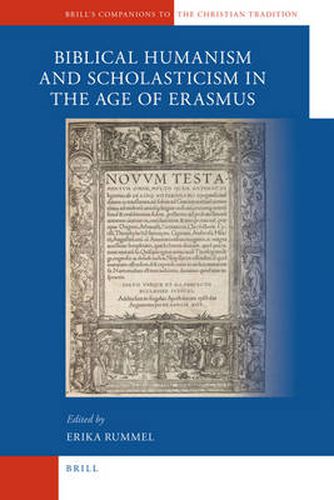Readings Newsletter
Become a Readings Member to make your shopping experience even easier.
Sign in or sign up for free!
You’re not far away from qualifying for FREE standard shipping within Australia
You’ve qualified for FREE standard shipping within Australia
The cart is loading…






Throughout the Middle Ages dialectical disputation was the prevailing method of scholarly inquiry. In the fifteenth century, however, humanists challenged the scholastic method, proposing instead historical and philological approaches. This volume focuses on the polemic over the right approach to biblical studies. It describes manifestations of the controversy, ranging from its beginnings in quattrocento Italy to Germany, Spain, France, the Netherlands, and scholars associated with the papal court in the sixteenth century. Erasmus, the most prominent biblical humanist of his day, served as a lightning rod for many of the controversies discussed here and has also received much attention from modern scholars. The chapters offered here seek to lend a voice also to Erasmus’ critics and to right the balance in a historical narrative that has traditionally favoured the humanists. Contributors are John Monfasani, Daniel Menager, Carlos del Valle Rodriguez, Alejandro Coroleu, Charles Fantazzi, Guy Bedouelle, James Farge, Cecilia Asso, Marcel Gielis, Paolo Sartori, Paul F. Grendler, Nelson H. Minnich, Ronald K. Delph
$9.00 standard shipping within Australia
FREE standard shipping within Australia for orders over $100.00
Express & International shipping calculated at checkout
Throughout the Middle Ages dialectical disputation was the prevailing method of scholarly inquiry. In the fifteenth century, however, humanists challenged the scholastic method, proposing instead historical and philological approaches. This volume focuses on the polemic over the right approach to biblical studies. It describes manifestations of the controversy, ranging from its beginnings in quattrocento Italy to Germany, Spain, France, the Netherlands, and scholars associated with the papal court in the sixteenth century. Erasmus, the most prominent biblical humanist of his day, served as a lightning rod for many of the controversies discussed here and has also received much attention from modern scholars. The chapters offered here seek to lend a voice also to Erasmus’ critics and to right the balance in a historical narrative that has traditionally favoured the humanists. Contributors are John Monfasani, Daniel Menager, Carlos del Valle Rodriguez, Alejandro Coroleu, Charles Fantazzi, Guy Bedouelle, James Farge, Cecilia Asso, Marcel Gielis, Paolo Sartori, Paul F. Grendler, Nelson H. Minnich, Ronald K. Delph